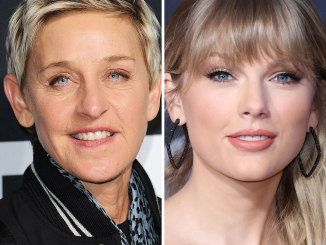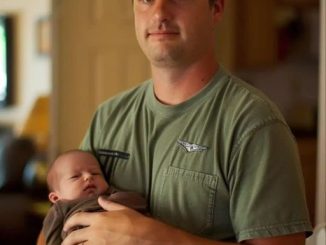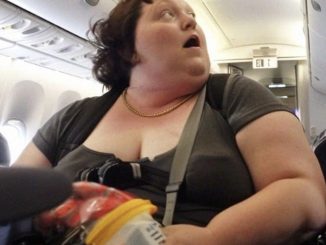
Even though TV’s most famous doctor was earning $700,000 per episode in the final season, *House* star Hugh Laurie said he still feels like a fraud.
Laurie regrets playing a “fake version” of a doctor instead of becoming a real one, as his father had hoped. He admitted that his “dad would have hated” the easier path he chose by becoming an actor.
Keep reading to find out why Laurie chose acting over medicine.
Dr. William (Ran) Laurie, Hugh’s father, had big dreams for his youngest son, born in June 1959.
Hugh Laurie was on track to follow in his father’s footsteps. His father was not only a respected physician but also a 1948 Olympic gold medalist in rowing and a graduate of a Cambridge college.
When British-born Hugh Laurie was studying at the same college as his father, he was also a member of the rowing team, with plans to train for the Olympics and then go to medical school.
However, Laurie discovered a drama club, the Cambridge Footlights, a sketch comedy group. There, he met actress Emma Thompson (*The Remains of the Day*) and his future comedy partner, Stephen Fry, who later co-starred with him in the 1997 film *Wilde*.
Laurie’s path changed completely.
Throughout the 1980s and 1990s, the now 64-year-old actor appeared in several TV shows, including the BBC sitcom *Blackadder*, where he co-starred with Fry.
Hugh Laurie also appeared in the 1995 film *Sense and Sensibility* with Emma Thompson, with whom he had once been in a relationship. He starred in Disney’s live-action *101 Dalmatians* (1996) and even made a guest appearance on *Friends*.
In 2004, Laurie was offered the chance to play a doctor in a new TV series called *House*, a medical drama that ran for eight seasons.
In his Golden Globe-winning role as Dr. Gregory House, Laurie dropped his British accent and perfectly played the narcissistic genius who led a teaching hospital in New Jersey.
During the show’s run, Laurie became Hollywood’s most popular doctor, gaining a huge global fan base. However, life as a celebrity also brought its own challenges.
“I had some pretty bleak times, dark days when it felt like there was no way out,” Hugh Laurie said in a 2013 interview with *Radio Times* (via *Daily Mail*). “I have a strong work ethic, so I was determined never to be late or miss a single day of filming. You wouldn’t catch me calling in sick, saying, ‘I think I’m getting the flu.’ But there were times when I’d think, ‘If I had a little accident on the way to the studio and got a couple of days off to recover, that would be great.’”
Those days off didn’t come until 2012, with the final season of *House*.
After that, Laurie kept busy, appearing in TV shows like *Veep* and the 2015 science fiction film *Tomorrowland*, which starred another famous TV doctor, George Clooney.
In 2016, Hugh Laurie took on another doctor role, this time as neuropsychiatrist Dr. Eldon Chance in the TV series *Chance*.
The *Maybe Baby* star explained to the *Los Angeles Daily News*, “As a gambler, my instinct is to walk away after even a modest win… Yet I was drawn back to this wonderful project that was simply irresistible.” Comparing *House* to his role in *Chance* (which was canceled after two seasons in 2017), Laurie said, “The characters are very different. Their medical practices and attitudes toward life are completely different.”
Despite his Hollywood fame, Laurie, who also starred in 2018’s *Holmes & Watson*, still feels he let his father down by not becoming a real doctor. His father, who passed away from Parkinson’s disease in 1998, had been a respected physician.
“My father was a real doctor. If it’s true that many men try to become versions of their father and fail, it seemed fitting that I ended up being a fake version of a doctor,” said Laurie, who also played a doctor in the 2005 film *The Big Empty*.
“My father had high hopes for me to follow him into medicine,” Hugh Laurie said. “I would have liked to become a doctor myself, and I still have dreams about being one. We live in a world of shortcuts, don’t we? And I took those shortcuts. Dad would have hated that.”
Laurie calls himself a “cop-out,” adding, “Honestly, this causes me a lot of guilt.”
What do you think about Hugh Laurie’s surprising confession? Please share your thoughts in the comments below and share this story so we can hear what others think!
My wife had been marking tally counts on her hands — when I discovered what she was tracking, I turned pale

When I noticed my wife drawing strange tally marks on her hand, I shrugged it off as a quirky habit. But as those marks multiplied and her answers remained cryptic, I realized something much darker was lurking beneath the surface of our seemingly happy marriage.
“Married life is great, right?” I would say to my friends when they asked. And for the most part, it was. We’d only been married for a few months, and I was still getting used to being a husband. My wife, Sarah, was always so organized, so thoughtful. She had a way of making everything seem effortless.
But then, something changed. I started noticing a strange habit of hers. One day, she pulled a pen out of her purse and made a small tally mark on the back of her hand. I didn’t think much of it at first.
“Did you just mark your hand?” I asked, raising an eyebrow.
She smiled and shrugged. “Just a reminder.”
“A reminder for what?” I laughed, thinking it was a joke. But she didn’t answer. She just changed the subject.
Over the next few weeks, she did it more and more. Some days, there’d be only one or two marks. Other days, five or more. Then there’d be days with nothing at all. It seemed random, but it bothered me. What was she keeping track of?
The more I noticed, the more I started to worry. It was like she was keeping a secret from me, and that secret was slowly eating away at our happiness.
One night, I couldn’t hold it in any longer.
“Sarah, what’s with the tally marks?” I asked as we were getting ready for bed. “You do it all the time now.”
She glanced at the marks on her hand, then looked at me with that same mysterious smile. “It helps me remember things, that’s all.”
“Remember what?” I pressed.
“It’s just… things,” she said, brushing me off like it was nothing. “Don’t worry about it.”
But I did worry. A lot. I started paying closer attention. She’d mark her hand after dinner. After we argued. After we watched a movie. There was no pattern I could see.
One evening, I counted the marks on her hand: seven. That night, I watched as she transferred them into a small notebook by her bedside table. She didn’t know I was watching.
I decided to check her notebook the next morning. I waited until she was in the shower, then flipped through the pages. Each page had rows and rows of tally marks. I counted them—68 in total.
I sat on the bed, staring at the notebook in my hands. What did this number mean? What was she counting?
I tried asking her again a few days later.
“Sarah, please tell me what those marks are for. It’s driving me crazy.”
She sighed, clearly annoyed. “I told you. It’s just something I do. It helps me remember.”
“That doesn’t make any sense!” I snapped. “What are you remembering? Are you keeping track of something? Someone?”
“Just drop it, okay?” she said, her voice sharp. She looked at me, her eyes pleading. “Please, just let it go.”
But I couldn’t let it go. The marks started to feel like a wall between us. Every time I saw her make a new one, it was like she was putting up another brick, shutting me out.
I became obsessed with the number 68. What was so important about it? I noticed I was being more careful around her, almost like I was afraid to give her a reason to add another mark. But then the marks would still appear, no matter what I did.
One night, after another tense conversation, I watched her add four new marks to her hand. I needed to know what was happening. I needed to figure this out before it drove me mad. But I had no idea how to get the truth out of her. And that scared me more than anything.
I couldn’t shake the feeling that our entire marriage was on the line, and I was helpless to stop whatever was happening between us. I left for several days to see if it changed anything. Well, the tally count has increased to 78 by the time I returned.
The obsession with Sarah’s tally marks was eating me alive. I needed a break from it, but everywhere I looked, I saw her hand with those little black lines, like they were taunting me. So, when Sarah suggested we visit her mother, I thought it would be a good distraction.
Her mother, Diane, and her fifth husband, Jake, lived in a cozy house in the suburbs. It was a typical Saturday afternoon visit: tea, cookies, and small talk. Sarah and her mom were in the kitchen, chatting and laughing. I excused myself to use the bathroom.
As I passed by the guest bedroom, something caught my eye. There, on the nightstand, was a notebook. It looked just like the one Sarah kept by her bed. I hesitated, but curiosity got the better of me. I stepped inside, glancing over my shoulder to make sure no one was watching.
I opened the notebook, my hands trembling. Inside, there were pages filled with tally marks, just like Sarah’s. But there was more. Next to the marks were labels: “interrupting,” “raising voice,” “forgetting to call.” Each tally had a label, like it was keeping track of mistakes.
“What the hell is this?” I muttered under my breath.
I felt a chill run down my spine. Was this some kind of family tradition? Was Sarah’s mom counting her own mistakes? Were they both holding themselves to these impossible standards?
I closed the notebook and returned to the living room, trying to act normal, but my mind was spinning. Sarah noticed my unease.
“You okay?” she asked, concern in her eyes.
“Yeah, I’m fine,” I lied. “Just thinking about work.”
We stayed for another hour, but I was barely present. My thoughts kept drifting back to that.
On the drive home, I couldn’t hold it in anymore.
“Sarah, I need to ask you something,” I said, gripping the steering wheel.
She looked at me, puzzled. “What’s up?”
“I saw your mom’s notebook today. It looked a lot like yours. Is this something you both do? Are you counting your mistakes? You don’t have to be perfect, you know. You don’t need to keep track of every little thing.”
There was a moment of silence, then she let out a bitter laugh.
“You think I’m counting my mistakes?”
“Well, yeah,” I said, relieved she was finally opening up. “You shouldn’t be so hard on yourself. It’s okay to mess up sometimes.”
She shook her head, staring out the window. “I’m not counting my mistakes, Jack. I’m counting yours.”
The words hit me like a punch in the gut. “What?”
“Every time you break one of your vows, I make a mark,” she said quietly. “When you interrupt me, when you don’t listen, when you say you’ll do something and don’t. I’ve been keeping track since our wedding.”
On our wedding day, I promised Sarah the world in my vows. I vowed never to lie, to always listen without interrupting, and to be there every time she needed me, no matter what. It was a long list of grand, heartfelt promises that sounded perfect in the moment, but looking back, they were almost impossible to keep.
I felt the blood drain from my face. “You’re counting my mistakes? Why?”
“Because I want to know when I’ve had enough,” she said, her voice breaking. “When you reach 1,000 marks, I’m leaving.”
I pulled the car over, my heart pounding. “You’re going to leave me? For breaking some stupid promises?”
“They’re not stupid promises,” she snapped. “They’re our wedding vows, Jack. You made them to me, and you’ve broken every single one.”
I stared at her, stunned. How had we gotten here? How had I missed this? I’d thought she was being hard on herself, but I was the one who’d been careless, dismissive. I wanted to be angry, but I couldn’t. I was too shocked, too hurt.
When we got home, I couldn’t sleep. I called Diane, desperate for answers.
“Sarah told me what she’s doing,” I said. “Why didn’t you stop her?”
Diane sighed. “I did the same thing with my past husbands. I thought it would help, but it just drove us apart. It ruined my marriages.”
“Then why let her—”
“I tried to tell her,” she interrupted gently. “But she needs to see it for herself. I count good days now, Jack. Good things my husband does. It changed everything.”
I hung up, feeling more lost than ever. I could only hope that my mother-in-law’s words fell on fertile ground.
That evening, Sarah came home with tears in her eyes. “I’m so sorry,” she whispered, wrapping her arms around me. “I didn’t realize how much this was hurting us.”
I held her close, feeling a mix of relief and hope. “Let’s forget the tally marks,” I said softly. “Let’s start fresh.”
The next day, I bought a new notebook—one for us to fill with good memories and happy moments. We made our first entry that night, writing about a quiet dinner we shared, laughing and talking like we hadn’t in months.
As we moved forward, the notebook became a symbol of our promise to focus on the positives and grow together. The tally marks were gone, replaced by stories of joy, love, and gratitude. We were finally on the same page, and it felt like the beginning of something beautiful.



Leave a Reply